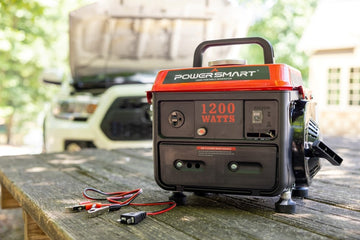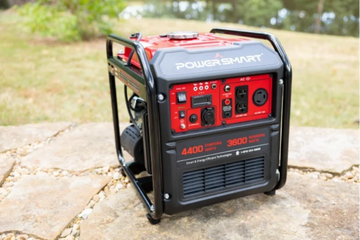Everything You Need to Know About Gas Generator Sizing for Home Use
by zq J on Oct 08, 2024

Selecting the appropriate size for a gas generator is crucial in ensuring that you have reliable power when you need it the most. A generator that is too small may not provide enough wattage to power essential appliances, leading to inconvenience and potential hazards during power outages. On the other hand, an oversized generator can result in wasted fuel and unnecessary expenses. Therefore, understanding your energy requirements is essential when choosing a gas generator. Proper sizing allows you to optimize performance and efficiency while also maximizing the lifespan of the generator.
What Are the Consequences of Selecting the Wrong Size?
Choosing an incorrectly sized gas generator can lead to significant consequences. If the generator is underpowered, it might struggle to handle the load, risking damage to both the generator and the connected appliances. This can also lead to overloading, which may cause the generator to shut down unexpectedly. Conversely, opting for an oversized generator could lead to excessive fuel consumption, higher maintenance costs, and increased emissions. Being aware of these potential pitfalls will help you make a more informed decision that aligns with your real energy needs.
How Does Generator Size Impact Efficiency and Performance?
The size of your gas generator directly affects its efficiency and performance. Generators are designed to operate best within a specific load range, and straying from this range can have adverse effects. When a generator operates consistently at a load that is too low or too high, it can cause wear and tear, reducing its operational lifespan. This inefficiency not only affects the generator itself but can also impact your energy costs. A well-sized generator will ensure optimal performance while maintaining fuel efficiency, allowing you to power your home without unnecessary strain.
How to Determine Your Wattage Needs for a Gas Generator?
Determining the correct wattage needs is the first step in selecting the right gas generator for your home. This involves calculating the total wattage of all appliances you plan to power during an outage. It is essential to recognize that different appliances require different amounts of starting and running wattage. Understanding these differences will provide clearer insight into your generator needs. Knowing your wattage requirements before purchasing a generator can save you time, money, and frustration in the long run.
How to Calculate the Total Wattage of Your Home Appliances?
To calculate the total wattage of your home appliances, you need to sum the starting and running wattages of each device you plan to connect to the generator. Starting wattage is the initial power required to start a device, which is typically higher than its running wattage. You can find this information on the appliance label or in the user manual. As you compile your list, it is advisable to account for appliances that may be used simultaneously. This will give you a clearer picture of the total wattage requirement, allowing for better sizing of your gas generator.
Why Should You Choose a Generator with Extra Capacity?
Opting for a gas generator with a little extra capacity can offer greater flexibility in meeting your power needs. While it is vital to accurately assess your wattage requirements, having a generator with additional capacity provides a safety buffer. This buffer is crucial in case you need to power additional appliances or devices in the future without needing to upgrade your generator. Furthermore, operating a generator below its capacity can enhance fuel efficiency and reduce wear on the engine over time. By choosing a generator from PowerSmart, such as the 1500W Inverter Gas Generator PS55, you ensure a reliable source of power that meets both current and future energy demands.
PowerSmart specializes in gas-powered generators designed with user convenience and efficiency in mind. The 1500W Inverter Gas Generator PS55 stands out with its portable design and is perfect for camping, outdoor events, and backup home power needs. This model delivers 1000 running watts and 1500 starting watts, making it suitable for various applications. With a lightweight design and easy setup, you can quickly take this generator wherever you need it, ensuring that you have dependable power on the go. When it comes to gas generators, choosing PowerSmart guarantees quality, performance, and peace of mind.
In summary, selecting the right size gas generator is crucial to effectively meeting your energy requirements while ensuring efficient performance. By carefully assessing your wattage needs, calculating appliance requirements, and opting for a generator with extra capacity, you can make a more informed decision. PowerSmart's 1500W Inverter Gas Generator PS55 represents a reliable option to power your essential devices, whether at home or on the go, thus addressing your energy concerns comprehensively.
What Size Gas Generator is Suitable for Your Home?
When selecting a gas generator for your home, it is vital to consider the specific power output required for your household needs. The size of the generator is measured in watts, which indicates the total electrical output the generator can provide. You can choose a generator based on the wattage needs of all the appliances that you plan to run simultaneously. By assessing your electric consumption accurately, you can narrow down the choices to those that will meet your power demands efficiently.
Which Common Gas Generator Sizes Fit Typical Household Needs?
Common sizes for household gas generators typically range from 2000 to 7000 watts, covering the electricity needs of most homes. A 2000-watt generator is sufficient for essential appliances like lights, fans, and small devices. On the other hand, a generator rated between 3000 to 5000 watts can power larger appliances such as a refrigerator, sump pump, and multiple lights. For homes with high energy demands, a generator with 6000 watts or more is suitable for running multiple heavy-duty appliances concurrently, including central heating systems or air conditioning units.
Can You Rely on an 80 Percent Coverage Rule?
The 80 percent coverage rule is a guideline that suggests you should only load a gas generator to 80 percent of its rated capacity to ensure reliable operation and longevity. Following this rule prevents overloading and decreases wear on your generator, resulting in better maintenance and performance over time. For example, if you have a 5000-watt generator, you should ideally use it for loads totaling no more than 4000 watts. This approach helps to provide a safety margin for unexpected surges in power demand while ensuring you don’t regularly operate at max capacity.
Expert Advice: Simplifying the Generator Sizing Process
Choosing the right size gas generator doesn’t have to be complicated if you follow a structured approach to determine your wattage needs. Begin by listing all the appliances you intend to run during an outage. Classifying these appliances into two categories—those that require additional starting watts and those that run continuously—will facilitate a better understanding of your total wattage requirement. Don’t forget to incorporate any devices that might not be in use constantly but could be connected to the generator during emergencies.
Why PowerSmart is Your Go-To Choice for Reliable Generators
PowerSmart stands out in the market for gas generators, bringing exceptional quality and performance to every product. The 1500W Inverter Gas Generator PS55 is specifically designed to provide you with a reliable source of power for a variety of applications. Its durable construction and user-friendly features make it a top choice among homeowners and outdoor enthusiasts alike. With a focus on customer satisfaction and making energy solutions accessible, PowerSmart serves as a trusted partner in your quest for dependable power.
Features to Look for in a Quality Home Use Gas Generator
When choosing a gas generator, several features stand out as essential for efficient home use.
- Power Output: As previously discussed, ensure the generator can handle the total wattage of the appliances you plan to connect. Always prepare for a buffer zone in case your power demands increase.
- Portability: A lightweight design facilitates effortless transportation, whether you’re using it at home or taking it on a camping trip. The PowerSmart 1500W Inverter Gas Generator PS55 exemplifies a portable generator that can be easily moved and set up.
- Fuel Efficiency: A quality gas generator should provide maximum output while consuming minimal fuel. Generators with efficient fuel management systems help reduce operating costs over the long term.
- Noise Levels: Excessive noise can be a nuisance, especially in quieter settings. Look for generators designed with sound-dampening technology, like the PowerSmart model, which ensures a quieter operation.
- Runtime: Consider how long the generator can run on a full tank of gas. A longer runtime means fewer refueling trips during power outages or when enjoying outdoor activities.
Choosing the right gas generator size is crucial for handling your household energy requirements. When selecting a gas generator model like the PowerSmart 1500W Inverter Gas Generator PS55 for your needs; Consider factors such as power output capacity,think about portability and ease of transportation evaluate fuel efficiency for cost effectiveness Look into noise levels to maintain an environment assess runtime to ensure continuous power supply The PowerSmart 1500W Inverter Gas Generator PS55 stands out as a reliable choice that offers consistent performance. It empowers you to run home appliances smoothly and provides flexibility.




